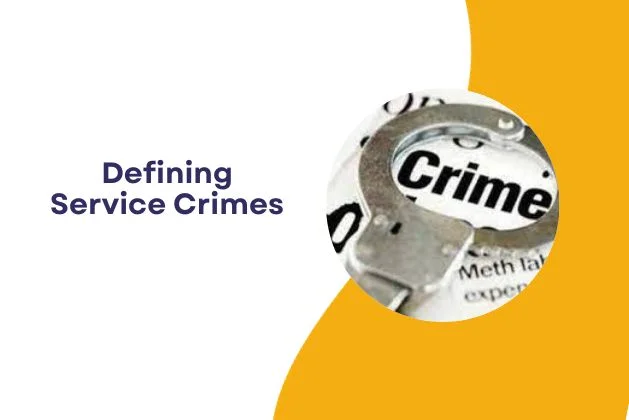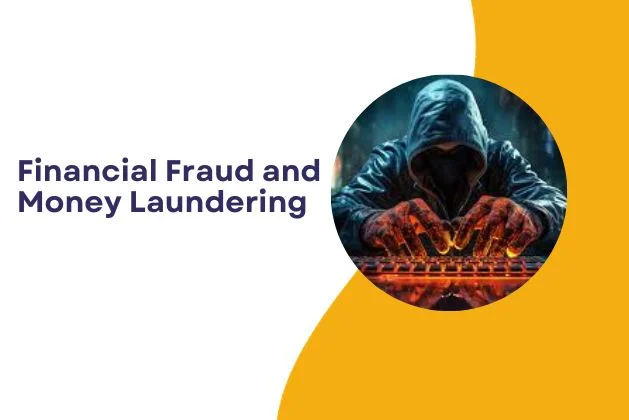Table of Contents
ToggleIntroduction
Within the intricate and multifaceted web of criminal activities, there exists a distinct realm that often operates in the shadows, known as service crimes.
Unlike conventional crimes that involve overt physical harm or blatant property damage, service crimes are often insidious and covert in nature.
They revolve around the provision of illicit services, such as fraud, cybercrime, human trafficking, and money laundering.
The term “service crimes” encompasses a wide range of illegal activities that are centered around providing illicit services to others.
These can include anything from operating a fake online business to trick unsuspecting individuals into giving away personal information, to participating in a network of human traffickers who exploit vulnerable individuals for profit.
One of the defining characteristics of service crimes is their subtlety and deceptive nature.
Perpetrators often employ sophisticated techniques and tactics to avoid detection and evade law enforcement.
Defining Service Crimes

Service crimes refer to a wide range of illicit activities that involve the provision of services that are either illegal or unethical in nature.
These nefarious acts can include cybercrime, fraud, human trafficking, and money laundering.
What sets service crimes apart is the exploitation of various services for immoral and unlawful purposes.
One form of service crime is cybercrime, which involves the use of technology to commit illegal activities such as hacking, identity theft, and online scams.
This type of crime has become increasingly prevalent in the digital age, with criminals taking advantage of vulnerable individuals and businesses through sophisticated techniques.
Fraud is another common service crime that involves deceiving others for personal gain.
This can take many forms, including insurance fraud, investment scams, and Ponzi schemes. Such actions not only harm innocent victims but also undermine trust in legitimate businesses and financial institutions.
The most heinous form of service crime is human trafficking, where individuals are exploited for labor or sexual purposes.
The Digital Underworld

As technology continues to advance, the digital age has opened up new opportunities for individuals to engage in service crimes.
These illegal activities, which range from hacking to identity theft, are now being offered by cybercriminals through various online platforms.
One particularly popular avenue is the dark web, where stolen data is bought and sold.
With the vast and interconnected nature of the internet, it has become increasingly difficult for authorities to track and combat these nefarious activities.
As a result, preventing these service crimes has become a daunting task in our modern society.
Financial Fraud and Money Laundering

Service crimes are a type of criminal activity that typically involve the use of financial deception.
These devious tactics can take various forms, such as fraudulent schemes, Ponzi schemes, and money laundering, and unfortunately, they are all too common in today’s society.
These crimes often target individuals and institutions alike, preying on their trust and exploiting vulnerabilities within financial systems. As a result, innocent victims are left to bear the consequences of these deceitful actions.
One of the most alarming aspects of service crimes is their constant evolution and adaptation.
Criminals are continually finding new ways to manipulate financial systems and exploit unsuspecting victims.
This ever-changing landscape poses a significant challenge for law enforcement agencies tasked with identifying and preventing these types of crimes.
The complex nature of service crimes makes them particularly difficult to detect and prosecute.
Perpetrators often use sophisticated techniques to cover their tracks and avoid detection, making it challenging for authorities to uncover their illegal activities.
Human Trafficking

Human trafficking, often referred to as the most abhorrent type of service crime, is a deeply disturbing issue that plagues our society.
This despicable act involves the exploitation of vulnerable individuals by organized criminal networks, who mercilessly subject them to a life of forced labor, sexual abuse and exploitation, or even the illegal trade of organs.
The secretive and sinister nature of this crime makes it extremely challenging to detect and prevent, thereby necessitating the urgent need for collaboration and cooperation between nations in order to effectively combat this modern-day form of slavery.
Environmental Crimes
Service crimes, which encompass a wide range of illegal activities, go beyond the realms of digital and financial misconduct.
In addition to cybercrime and financial fraud, this category also includes offenses such as illegal waste disposal, poaching, and environmental pollution.
These types of crimes not only have detrimental effects on the environment, but also pose serious threats to ecosystems, wildlife, and public health.
Illegal waste disposal, for example, involves the improper dumping or disposal of hazardous materials that can contaminate soil and water sources.
This can lead to toxic chemicals seeping into the ground and polluting drinking water supplies, causing harm to both human health and the natural environment.
Poaching is another type of service crime that has severe consequences for both animal populations and their habitats.
The illegal hunting or killing of endangered species not only disrupts delicate ecosystems but also drives these animals closer to extinction.
Challenges for Law Enforcement
The investigation and prevention of service crimes poses a complex and ever-evolving challenge for law enforcement agencies.
These types of crimes often transcend geographic boundaries, making international cooperation crucial in their detection and prosecution.
Moreover, the highly sophisticated nature of cybercrime demands a constant evolution of technological capabilities and the development of advanced investigative techniques.
Service crimes, which encompass a wide range of illegal activities such as fraud, money laundering, human trafficking, and cybercrime, operate in a borderless realm that makes it difficult for any single agency to tackle them effectively.
This is why collaboration between law enforcement agencies from different countries is crucial in order to share information, resources, and expertise to combat these transnational crimes.
In particular, the rapidly advancing world of technology has led to an increase in cybercrime that requires law enforcement agencies to constantly upgrade their technological capabilities.
Impact on Society
The repercussions of service crimes are not only severe, but also deeply pervasive.
The effects of these offenses extend beyond just the immediate victims; they have a profound and far-reaching impact on individuals, businesses, and governments alike.
Financial losses are often incurred as a result of these crimes, causing significant harm to the economy and stability of communities.
Furthermore, the erosion of trust in online transactions and institutions is another major consequence that compounds the societal ramifications of service crimes.
With an increasing number of people falling prey to fraudulent schemes and scams online, there is a growing sense of fear and suspicion surrounding virtual transactions.
Prevention and Collaboration
Preventing service crimes is a complex and multifaceted endeavor that requires the cooperation and coordination of various entities.
This includes governments, law enforcement agencies, and private organizations, all of which must work together to effectively combat this issue.
One crucial aspect of preventing service crimes is the sharing of intelligence between these different entities.
By pooling their resources and information, they can gain a more comprehensive understanding of the tactics and strategies used by criminals in this area.
This can also help identify patterns and trends in service crimes, allowing for more targeted prevention efforts.
Moreover, developing robust cybersecurity measures is essential in preventing service crimes from occurring.
As technology continues to advance, criminals are finding new ways to exploit vulnerabilities in online systems and steal sensitive information.
By implementing strong cybersecurity protocols, such as encryption and multi-factor authentication, businesses and organizations can better protect themselves from cyber attacks.
Also Read: General Register Organization
Raising Awareness
It is of utmost importance to bring attention to the existence and ramifications of service crimes.
These types of offenses pose a significant threat to individuals and businesses alike, making it imperative to educate people on how to protect themselves against cyber attacks.
This includes promoting cybersecurity best practices and providing guidance on how to recognize potential signs of fraud.
Moreover, it is crucial for individuals and businesses to understand the broader impact that service crimes can have on society as a whole.
These crimes not only cause financial harm but also erode trust in institutions and disrupt the flow of Service crimes lurking in the shadows, taking advantage of their clandestine nature to operate undetected and unimpeded.
These insidious offenses weave a complex web that undermines the very foundations of law and order, posing a serious threat to our society. As technology continues to advance at a rapid pace, criminal enterprises have also become more sophisticated, making it even more challenging to combat these illegal activities.
The fight against service crimes is an ongoing battle that requires a collective and relentless effort from all sectors of society.
It is not a task that can be accomplished by any single entity alone.
Instead, it demands a united front, with government agencies, law enforcement bodies, and the general public working hand in hand to tackle this pervasive issue.
Conclusion
Service crimes operate in the shadows, weaving a complex web that challenges the foundations of law and order.
As technology advances and criminal enterprises become more sophisticated, the fight against service crimes requires a collective and relentless effort.
By understanding their nature, raising awareness, and fostering international cooperation, we can work towards dismantling the intricate networks that perpetuate these illicit services, ultimately striving for a safer and more secure world.
Frequently Asked Questions (FAQs)
A service crime refers to an illegal or unethical activity that involves providing illicit services rather than causing physical harm or property damage. These crimes can range from cybercrime and fraud to human trafficking and money laundering.
While traditional crimes involve direct physical harm or property damage, service crimes revolve around providing illegal services. They often operate in more covert ways, exploiting various services for criminal gain, such as cybercrimes, financial fraud, or human trafficking.
Examples of service crimes include cybercrimes like hacking and identity theft, financial fraud such as Ponzi schemes and money laundering, human trafficking, and environmental crimes like illegal waste disposal and poaching.
Service crimes have become more prevalent in the digital age due to the increased connectivity and reliance on technology. Cybercrimes, in particular, have seen a significant rise as criminals exploit vulnerabilities in digital systems for various illegal activities.
Law enforcement agencies face numerous challenges in combating service crimes, including the borderless nature of many activities, the constant evolution of cybercrime tactics, and the need for advanced technological capabilities. International collaboration and continuous adaptation are crucial.
The impact of service crimes is profound and diverse. Individuals and businesses may suffer financial losses, while victims of human trafficking endure severe trauma. Additionally, service crimes can erode trust in online transactions, institutions, and even threaten public health and the environment.
Preventing service crimes requires a multi-faceted approach. This includes international collaboration among law enforcement agencies, the development of advanced cybersecurity measures, stringent regulations, and raising awareness among individuals and businesses about the risks and preventive measures.
Various regulations exist to address different aspects of service crimes. For example, cybercrime laws, anti-money laundering regulations, and international conventions against human trafficking are in place. However, the evolving nature of these crimes necessitates ongoing updates and enhancements to regulatory frameworks.
Individuals can protect themselves by staying informed about common scams, practicing good cybersecurity habits (e.g., using strong passwords, being cautious with online transactions), and being aware of the signs of fraud. Regularly updating software and being cautious about sharing personal information are also essential.
Yes, there are international efforts to combat service crimes. Various organizations, such as Interpol and the United Nations Office on Drugs and Crime (UNODC), facilitate collaboration among countries to address transnational crimes. Additionally, regional agreements and conventions focus on specific aspects of service crimes, promoting a coordinated global response.



